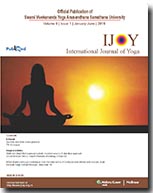 A paper concluding that a specific series of yoga poses is effective at promoting weight loss in obese women has a call for retraction in a letter to the editor of the International Journal of Yoga.
A paper concluding that a specific series of yoga poses is effective at promoting weight loss in obese women has a call for retraction in a letter to the editor of the International Journal of Yoga.
The study followed 87 women for 8 weeks as they completed a regular routine of yoga, circuit training, or walking on a treadmill. “Suryanamaskar: An equivalent approach towards management of physical fitness in obese females” concludes that
All three methods were effective in weight and physical fitness management.
But a group of heath researchers at the University of Alabama at Birmingham led by David Allison failed to replicate the statistical tests on some of the data. In a recent letter to the editor, “Unsubstantiated conclusions from improper statistical design and analysis of a randomized controlled trial,” they express skepticism about the paper’s claims, and ask the journal to retract it:
…severe problems with the design and analysis of the study make the reported results highly questionable.
Allison and his co-authors outline several concerns, including the fact that the authors did not randomize participants to different treatment groups.
By violating both the principles of random allocation, the study reported cannot be properly referred to as [a randomized controlled trial].
The letter-writers also voiced concerns over the authors’ statistical analysis, which they couldn’t replicate:
[Table 2] of Jakhotia et al. reports baseline characteristics and tests for differences among the four groups using a repeated measures analysis of variance; this is an inappropriate test because there should only be data from one time point to consider. Furthermore, we attempted to replicate the tests using the provided summary statistics and calculated incompatible results.
The authors’ entire approach to the research question is faulty, Allison and his team write:
The objective of this study was to find differences in health-related outcomes between three exercise regimens and a control group, but the core of their conclusions focused on whether pairwise differences within the treatment groups were significantly different from baseline. This approach, where differences in nominal significance within-groups are interpreted as significant differences between the groups, is statistically invalid, producing false positives at a rate up to 87.5% for four groups. That approach should never be used; instead we suggest performing post hoc exploratory pairwise comparisons with a multiple testing correction.
The letter concludes by asking the journal to retract the paper:
Considering the compromised randomization, the irreproducible baseline statistics, the use of subsequent analytical strategies that depended on the faulty baseline statistics, and the inferences inappropriately based on within-group comparisons, we believe retraction of Jakhotia et al. is consistent with the recommendation of the International Committee of Medical Journal Editors: “Errors serious enough to invalidate a paper’s results and conclusions may require retraction”.
The paper has been cited once, according to Thomson Scientific’s Web of Knowledge.
Allison and his co-authors sent us a joint statement, noting they have not heard from the journal about its plans for the article:
The formal letter to the editor was our first approach to the article in this situation. Although we encouraged the editorial staff to retract the original article in our last direct correspondence following acceptance of our letter, they have made no indication to us that it will be retracted.
We’ve reached out to the first author of the paper, Komal A Jakhotia, whose LinkedIn profile says she is currently a physiotherapist in Seattle. We have also contacted corresponding author Apurv P Shimpi, who works at the Sancheti Institute College of Physiotherapy in India, and to the journal to see if it plans to retract the article. We’ll update this post with anything else we learn.
Update, February 4th 2016, 10:30 am EST:
Author Jakhotia told us:
I am planning to retract the paper as there are some concerns regarding methodology and statistics.
But an editor at the journal, Raghavendra Bhat, told us:
The editorial team has decided not to retract the article.
We’ve asked Bhat about the discrepancy.
Since this post went up, we’ve published a Q&A with Allison titled, “Want to correct the scientific literature? Good luck.”
Like Retraction Watch? Consider making a tax-deductible contribution to support our growth. You can also follow us on Twitter, like us on Facebook, add us to your RSS reader, sign up on our homepage for an email every time there’s a new post, or subscribe to our new daily digest. Click here to review our Comments Policy.